Mises, Ludwig von. Theory and History: An Interpretation of Social and Economic Evolution
Подождите немного. Документ загружается.

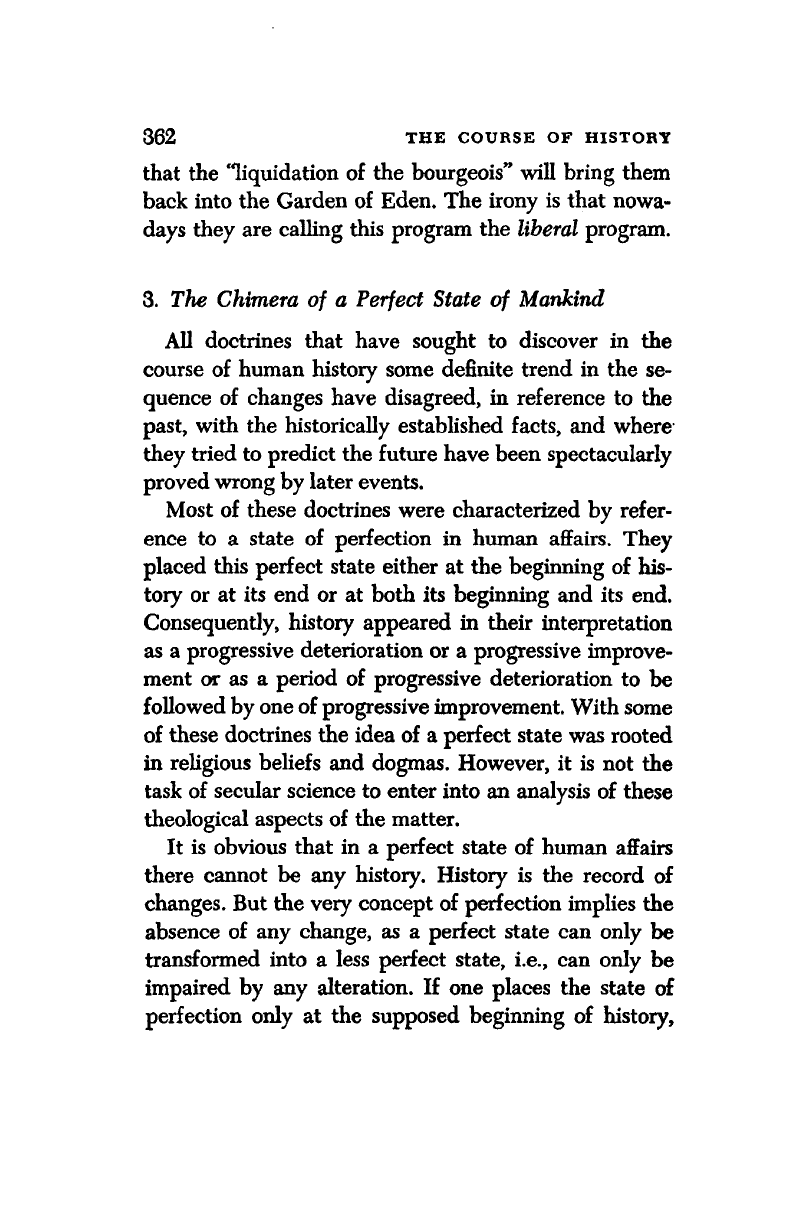
362 THE COURSE OF HISTORY
that the 'liquidation of the bourgeois" will bring them
back into the Garden of Eden. The irony is that nowa-
days they are calling this program the liberal program.
3.
The Chimera of a Perfect State of Mankind
All doctrines that have sought to discover in the
course of human history some definite trend in the se-
quence of changes have disagreed, in reference to the
past, with the historically established facts, and where
they tried to predict the future have been spectacularly
proved wrong by later events.
Most of these doctrines were characterized by refer-
ence to a state of perfection in human affairs. They
placed this perfect state either at the beginning of his-
tory or at its end or at both its beginning and its end.
Consequently, history appeared in their interpretation
as a progressive deterioration or a progressive improve-
ment or as a period of progressive deterioration to be
followed by one of progressive improvement. With some
of these doctrines the idea of a perfect state was rooted
in religious beliefs and dogmas. However, it is not the
task of secular science to enter into an analysis of these
theological aspects of the matter.
It is obvious that in a perfect state of human affairs
there cannot be any history. History is the record of
changes. But the very concept of perfection implies the
absence of any change, as a perfect state can only be
transformed into a less perfect state, i.e., can only be
impaired by any alteration. If one places the state of
perfection only at the supposed beginning of history,
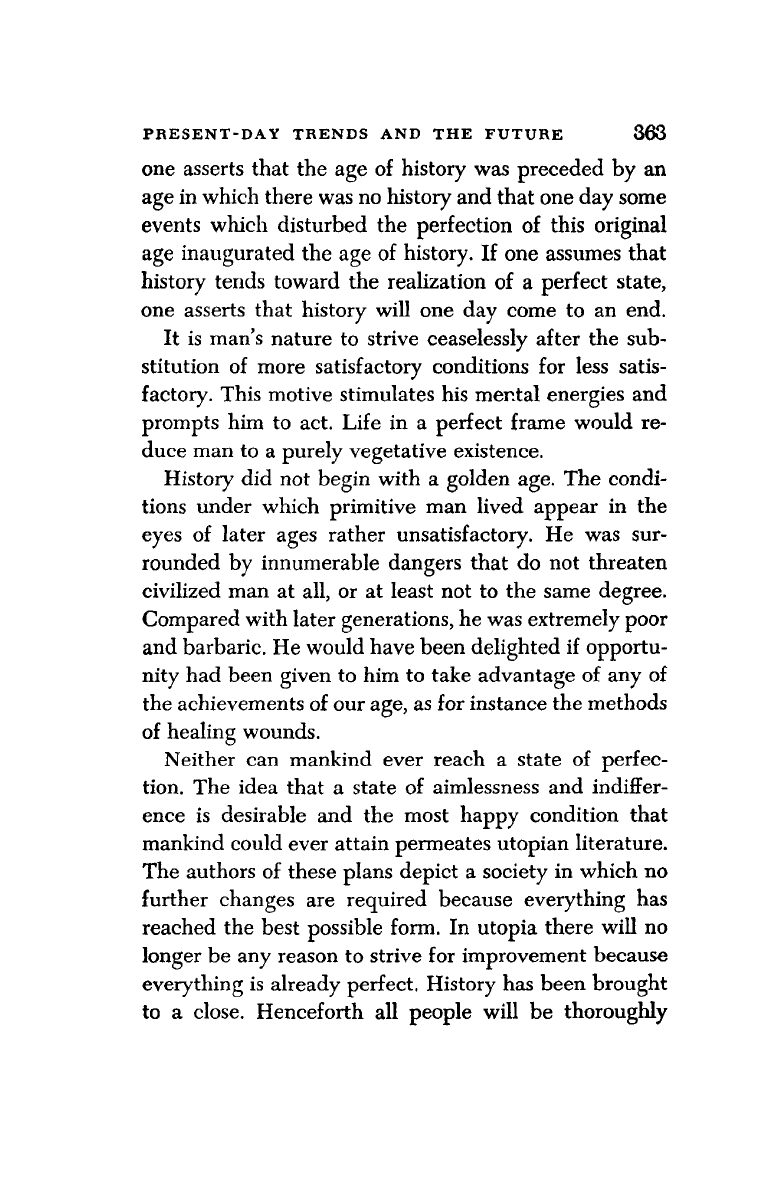
PRESENT-DAY TRENDS AND THE FUTURE 363
one asserts that the age
of
history was preceded by
an
age in which there was no history and that one day some
events which disturbed
the
perfection
of
this original
age inaugurated the age
of
history.
If
one assumes that
history tends toward the realization
of a
perfect state,
one asserts that history will one day come
to an
end.
It
is
man's nature
to
strive ceaselessly after the sub-
stitution
of
more satisfactory conditions
for
less satis-
factory. This motive stimulates his mental energies and
prompts him
to
act. Life
in a
perfect frame would re-
duce man to a purely vegetative existence.
History did not begin with
a
golden age. The condi-
tions under which primitive man lived appear
in the
eyes
of
later ages rather unsatisfactory.
He
was
sur-
rounded
by
innumerable dangers that do not threaten
civilized man
at
all,
or at
least not
to
the same degree.
Compared with later generations, he was extremely poor
and barbaric. He would have been delighted
if
opportu-
nity had been given to him to take advantage
of
any of
the achievements of our age, as for instance the methods
of healing wounds.
Neither
can
mankind ever reach
a
state
of
perfec-
tion. The idea that
a
state
of
aimlessness and indiffer-
ence
is
desirable
and the
most happy condition that
mankind could ever attain permeates Utopian literature.
The authors
of
these plans depict
a
society in which no
further changes
are
required because everything
has
reached the best possible form.
In
Utopia there will no
longer be any reason to strive for improvement because
everything is already perfect. History has been brought
to
a
close. Henceforth
all
people will
be
thoroughly
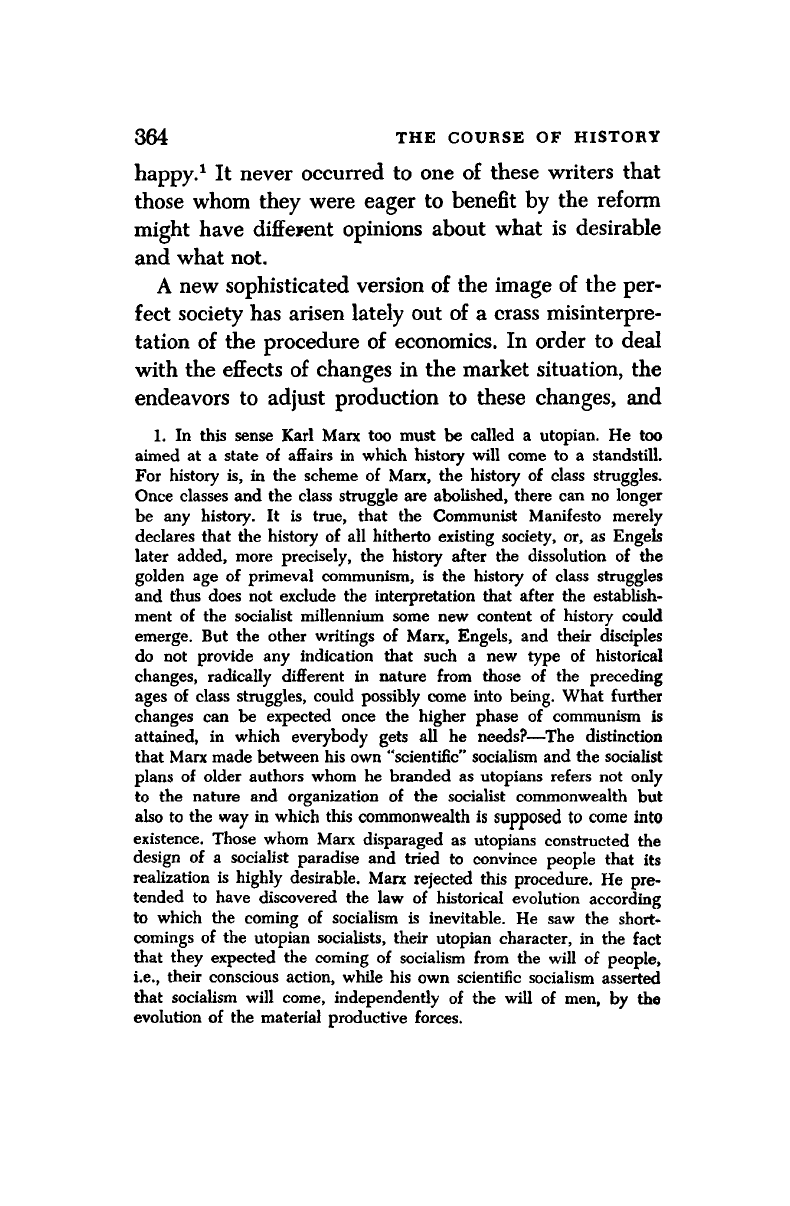
364 THE COURSE OF HISTORY
happy.
1
It never occurred to one of these writers that
those whom they were eager to benefit by the reform
might have different opinions about what is desirable
and what not.
A new sophisticated version of the image of the per-
fect society has arisen lately out of a crass misinterpre-
tation of the procedure of economics. In order to deal
with the effects of changes in the market situation, the
endeavors to adjust production to these changes, and
1.
In this sense Karl Marx too must be called a Utopian. He too
aimed at a state of affairs in which history will come to a standstill.
For history is, in the scheme of Marx, the history of class struggles.
Once classes and the class struggle are abolished, there can no longer
be any history. It is true, that the Communist Manifesto merely
declares that the history of all hitherto existing society, or, as Engels
later added, more precisely, the history after the dissolution of the
golden age of primeval communism, is the history of class struggles
and thus does not exclude the interpretation that after the establish-
ment of the socialist millennium some new content of history could
emerge. But the other writings of Marx, Engels, and their disciples
do not provide any indication that such a new type of historical
changes, radically different in nature from those of the preceding
ages of class struggles, could possibly come into being. What further
changes can be expected once the higher phase of communism is
attained, in which everybody gets all he needs?—The distinction
that Marx made between his own "scientific" socialism and the socialist
plans of older authors whom he branded as Utopians refers not only
to the nature and organization of the socialist commonwealth but
also to the way in which this commonwealth is supposed to come into
existence. Those whom Marx disparaged as Utopians constructed the
design of a socialist paradise and tried to convince people that its
realization is highly desirable. Marx rejected this procedure. He pre-
tended to have discovered the law of historical evolution according
to which the coming of socialism is inevitable. He saw the short-
comings of the Utopian socialists, their Utopian character, in the fact
that they expected the coming of socialism from the will of people,
i.e., their conscious action, while his own scientific socialism asserted
that socialism will come, independently of the will of men, by the
evolution of the material productive forces.
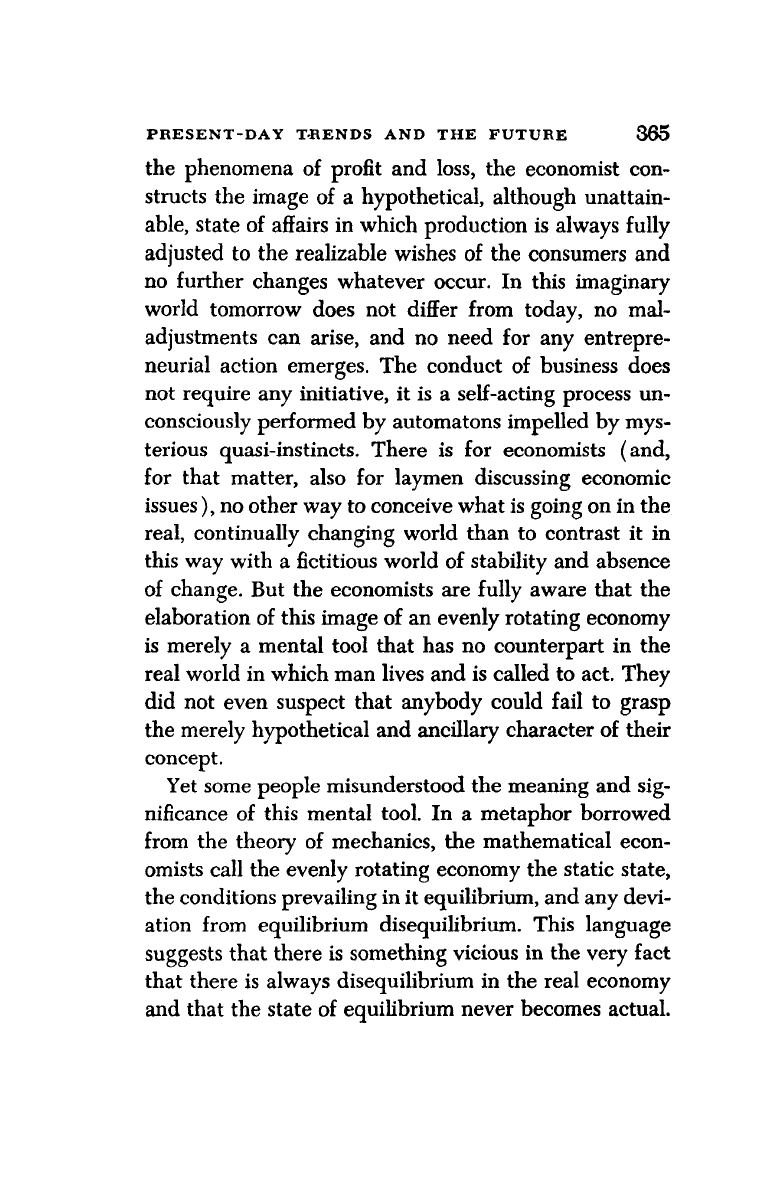
PRESENT-DAY TRENDS AND THE FUTURE 365
the phenomena
of
profit and loss,
the
economist con-
structs the image
of a
hypothetical, although unattain-
able, state
of
affairs in which production is always fully
adjusted
to
the realizable wishes
of
the consumers and
no further changes whatever occur.
In
this imaginary
world tomorrow does
not
differ from today,
no
mal-
adjustments can arise, and
no
need
for
any entrepre-
neurial action emerges. The conduct
of
business does
not require any initiative,
it is a
self-acting process un-
consciously performed by automatons impelled by mys-
terious quasi-instincts. There
is for
economists
(and,
for that matter, also
for
laymen discussing economic
issues), no other way to conceive what is going on in the
real, continually changing world than
to
contrast
it in
this way with
a
fictitious world
of
stability and absence
of change. But the economists are fully aware that the
elaboration of this image
of
an evenly rotating economy
is merely
a
mental tool that has
no
counterpart
in the
real world in which man lives and is called to act. They
did not even suspect that anybody could fail
to
grasp
the merely hypothetical and ancillary character
of
their
concept.
Yet some people misunderstood the meaning and sig-
nificance
of
this mental tool.
In a
metaphor borrowed
from the theory
of
mechanics, the mathematical econ-
omists call the evenly rotating economy the static state,
the conditions prevailing in it equilibrium, and any devi-
ation from equilibrium disequilibrium. This language
suggests that there is something vicious in the very fact
that there
is
always disequilibrium
in
the real economy
and that the state
of
equilibrium never becomes actual.
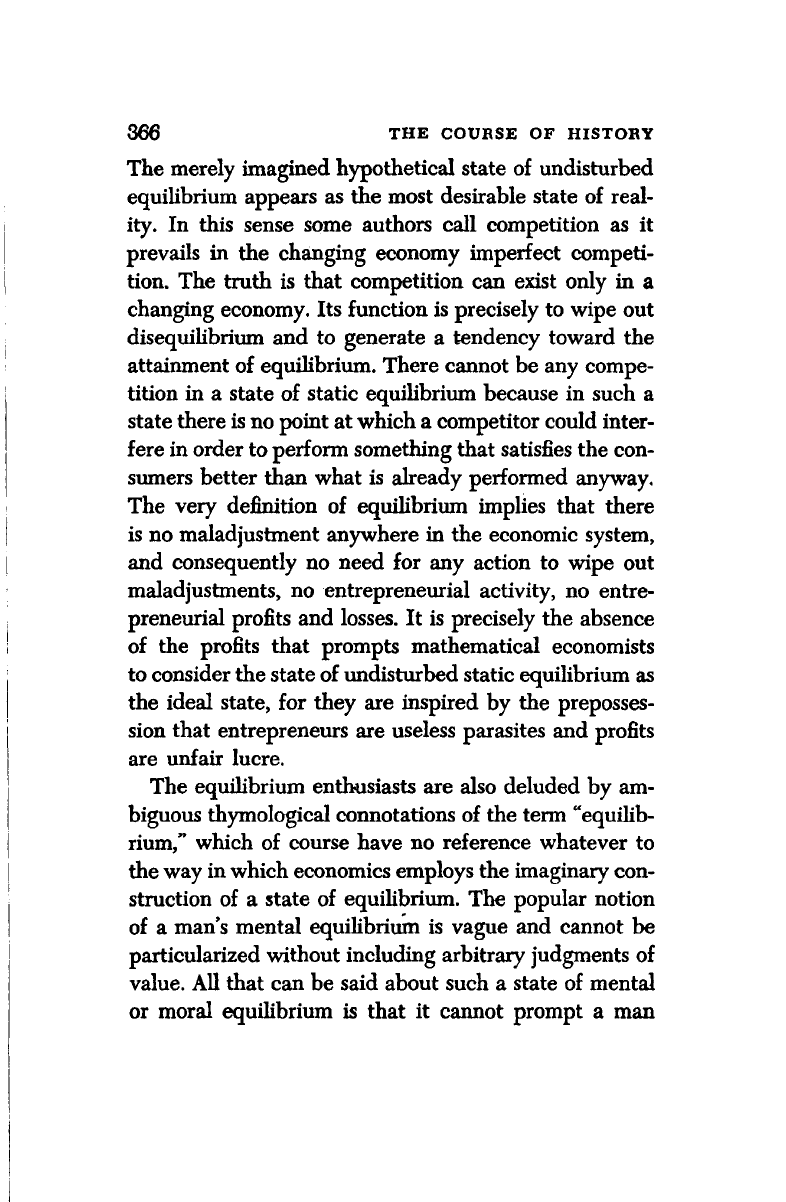
366 THE COURSE OF HISTORY
The merely imagined hypothetical state of undisturbed
equilibrium appears as the most desirable state of real-
ity. In this sense some authors call competition as it
prevails in the changing economy imperfect competi-
tion.
The truth is that competition can exist only in a
changing economy. Its function is precisely to wipe out
disequilibrium and to generate a tendency toward the
attainment of equilibrium. There cannot be any compe-
tition in a state of static equilibrium because in such a
state there is no point at which a competitor could inter-
fere in order to perform something that satisfies the con-
sumers better than what is already performed anyway.
The very definition of equilibrium implies that there
is no maladjustment anywhere in the economic system,
and consequently no need for any action to wipe out
maladjustments, no entrepreneurial activity, no entre-
preneurial profits and losses. It is precisely the absence
of the profits that prompts mathematical economists
to consider the state of undisturbed static equilibrium as
the ideal state, for they are inspired by the preposses-
sion that entrepreneurs are useless parasites and profits
are unfair lucre.
The equilibrium enthusiasts are also deluded by am-
biguous thymological connotations of the term "equilib-
rium," which of course have no reference whatever to
the way in which economics employs the imaginary con-
struction of a state of equilibrium. The popular notion
of a man's mental equilibrium is vague and cannot be
particularized without including arbitrary judgments of
value. All that can be said about such a state of mental
or moral equilibrium is that it cannot prompt a man
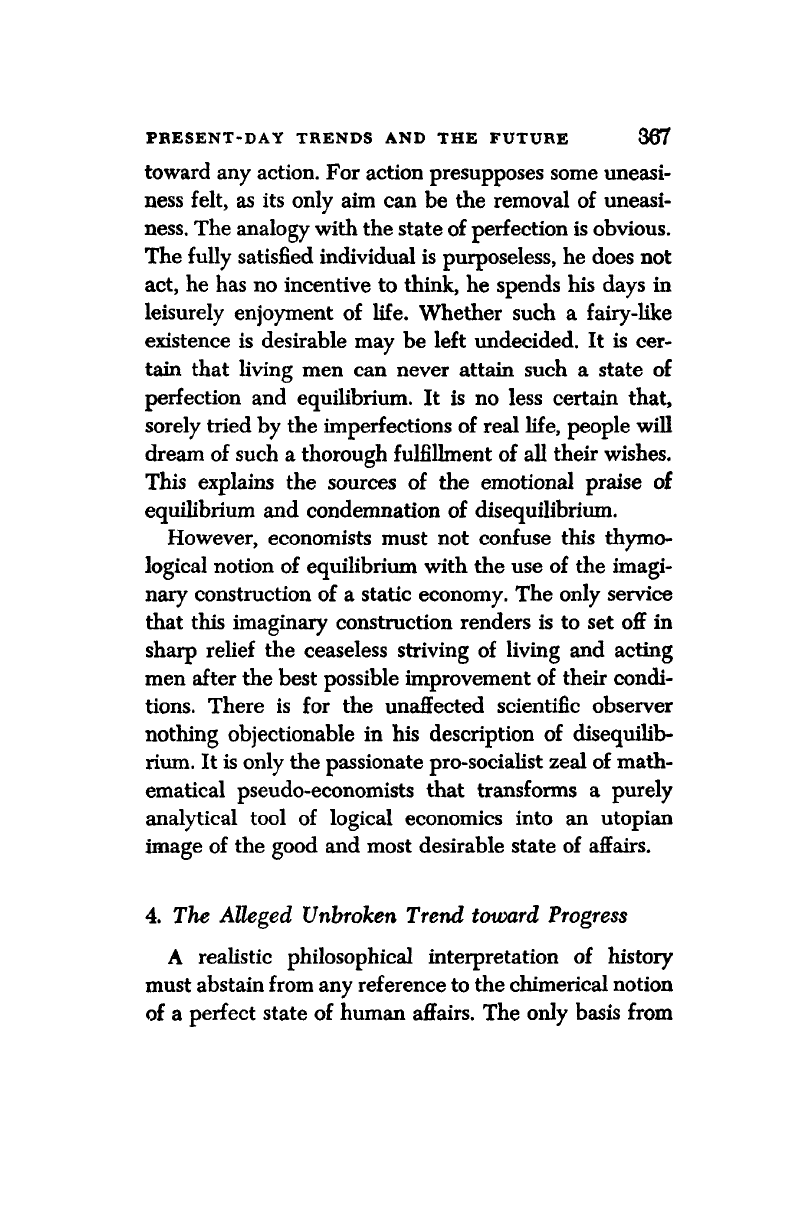
PRESENT-DAY TRENDS AND THE FUTURE 367
toward any action. For action presupposes some uneasi-
ness felt, as its only aim can be the removal of uneasi-
ness.
The analogy with the state of perfection is obvious.
The fully satisfied individual is purposeless, he does not
act, he has no incentive to think, he spends his days in
leisurely enjoyment of life. Whether such a fairy-like
existence is desirable may be left undecided. It is cer-
tain that living men can never attain such a state of
perfection and equilibrium. It is no less certain that,
sorely tried by the imperfections of real life, people will
dream of such a thorough fulfillment of all their wishes.
This explains the sources of the emotional praise of
equilibrium and condemnation of disequilibrium.
However, economists must not confuse this thymo-
logical notion of equilibrium with the use of the imagi-
nary construction of a static economy. The only service
that this imaginary construction renders is to set off in
sharp relief the ceaseless striving of living and acting
men after the best possible improvement of their condi-
tions.
There is for the unaffected scientific observer
nothing objectionable in his description of disequilib-
rium. It is only the passionate pro-socialist zeal of math-
ematical pseudo-economists that transforms a purely
analytical tool of logical economics into an Utopian
image of the good and most desirable state of affairs.
4.
The Alleged Unbroken Trend toward Progress
A realistic philosophical interpretation of history
must abstain from any reference to the chimerical notion
of a perfect state of human affairs. The only basis from
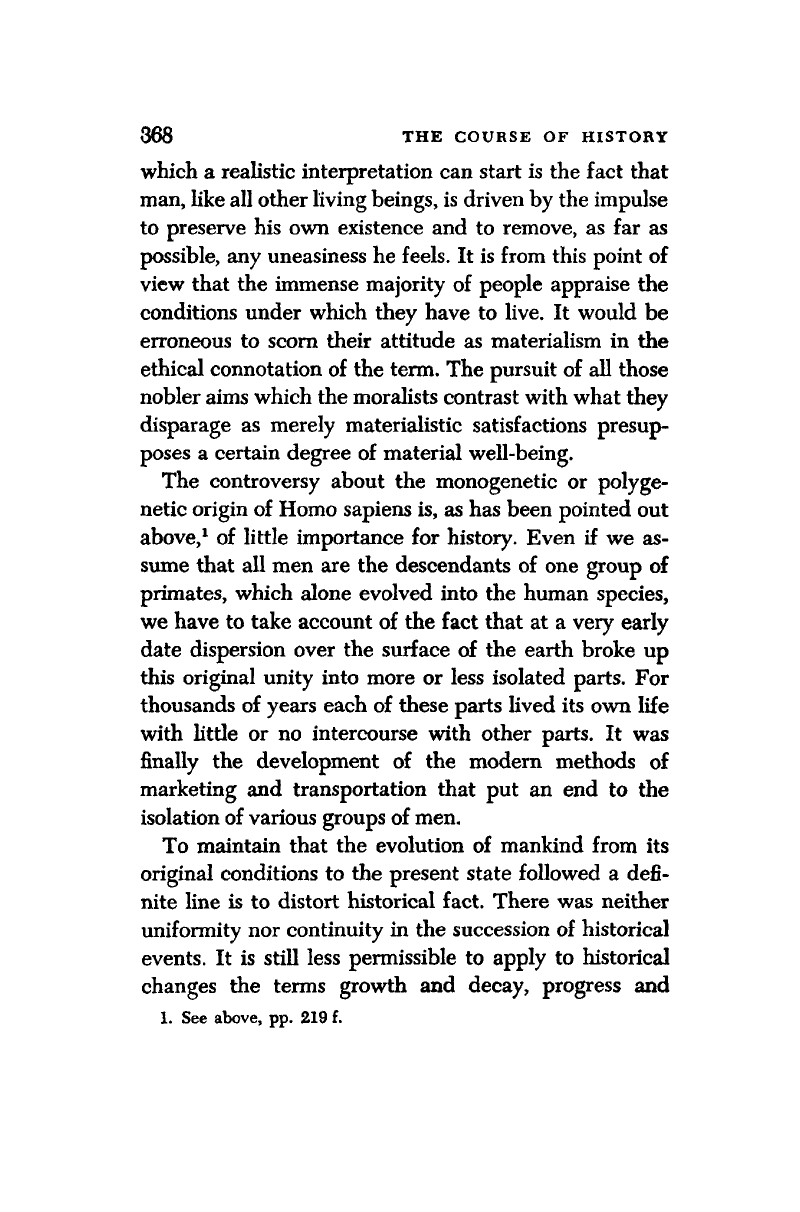
THE COURSE OF HISTORY
which a realistic interpretation can start is the fact that
man,
like all other living beings, is driven by the impulse
to preserve his own existence and to remove, as far as
possible, any uneasiness he feels. It is from this point of
view that the immense majority of people appraise the
conditions under which they have to live. It would be
erroneous to scorn their attitude as materialism in the
ethical connotation of the term. The pursuit of all those
nobler aims which the moralists contrast with what they
disparage as merely materialistic satisfactions presup-
poses a certain degree of material well-being.
The controversy about the monogenetic or polyge-
netic origin of Homo sapiens is, as has been pointed out
above,
1
of little importance for history. Even if we as-
sume that all men are the descendants of one group of
primates, which alone evolved into the human species,
we have to take account of the fact that at a very early
date dispersion over the surface of the earth broke up
this original unity into more or less isolated parts. For
thousands of years each of these parts lived its own life
with little or no intercourse with other parts. It was
finally the development of the modern methods of
marketing and transportation that put an end to the
isolation of various groups of men.
To maintain that the evolution of mankind from its
original conditions to the present state followed a defi-
nite line is to distort historical fact. There was neither
uniformity nor continuity in the succession of historical
events. It is still less permissible to apply to historical
changes the terms growth and decay, progress and
1.
See above, pp. 219 f.
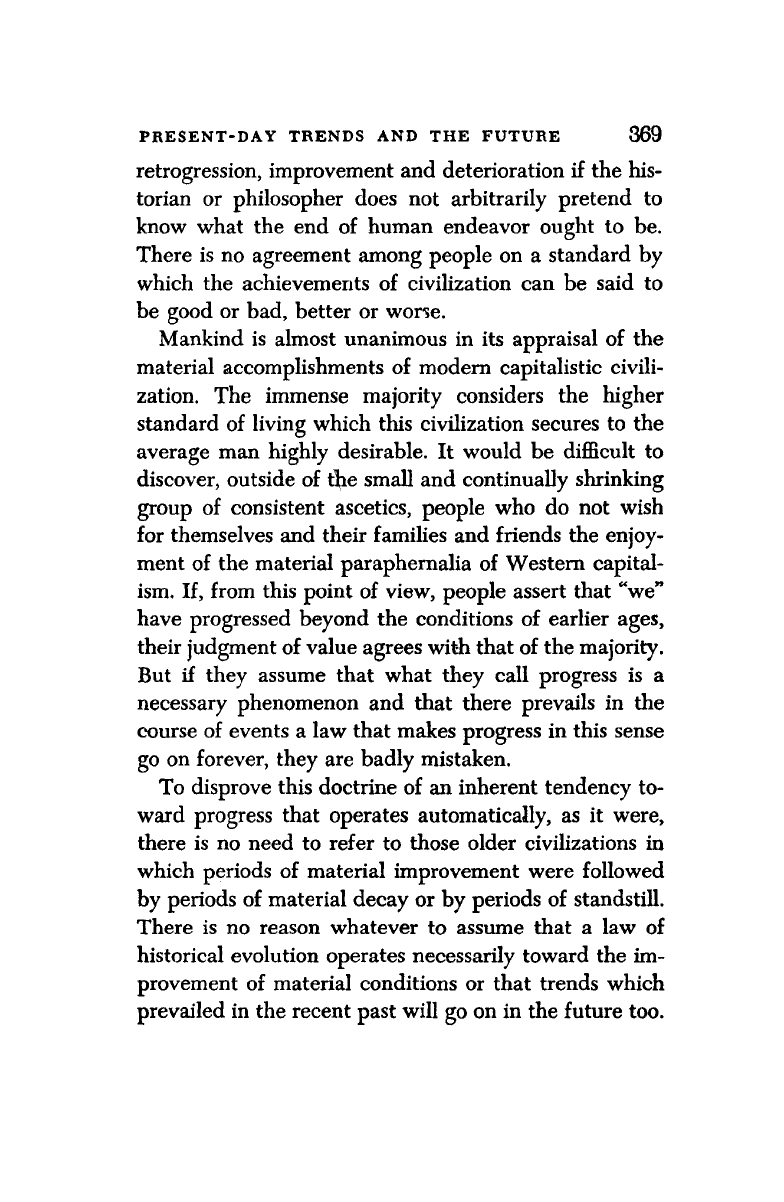
PRESENT-DAY TRENDS AND THE FUTURE 369
retrogression, improvement and deterioration if the his-
torian or philosopher does not arbitrarily pretend to
know what the end of human endeavor ought to be.
There is no agreement among people on a standard by
which the achievements of civilization can be said to
be good or bad, better or worse.
Mankind is almost unanimous in its appraisal of the
material accomplishments of modern capitalistic civili-
zation. The immense majority considers the higher
standard of living which this civilization secures to the
average man highly desirable. It would be difficult to
discover, outside of ti(ie small and continually shrinking
group of consistent ascetics, people who do not wish
for themselves and their families and friends the enjoy-
ment of the material paraphernalia of Western capital-
ism.
If, from this point of view, people assert that "we"
have progressed beyond the conditions of earlier ages,
their judgment of value agrees with that of the majority.
But if they assume that what they call progress is a
necessary phenomenon and that there prevails in the
course of events a law that makes progress in this sense
go on forever, they are badly mistaken.
To disprove this doctrine of an inherent tendency to-
ward progress that operates automatically, as it were,
there is no need to refer to those older civilizations in
which periods of material improvement were followed
by periods of material decay or by periods of standstill.
There is no reason whatever to assume that a law of
historical evolution operates necessarily toward the im-
provement of material conditions or that trends which
prevailed in the recent past will go on in the future too.
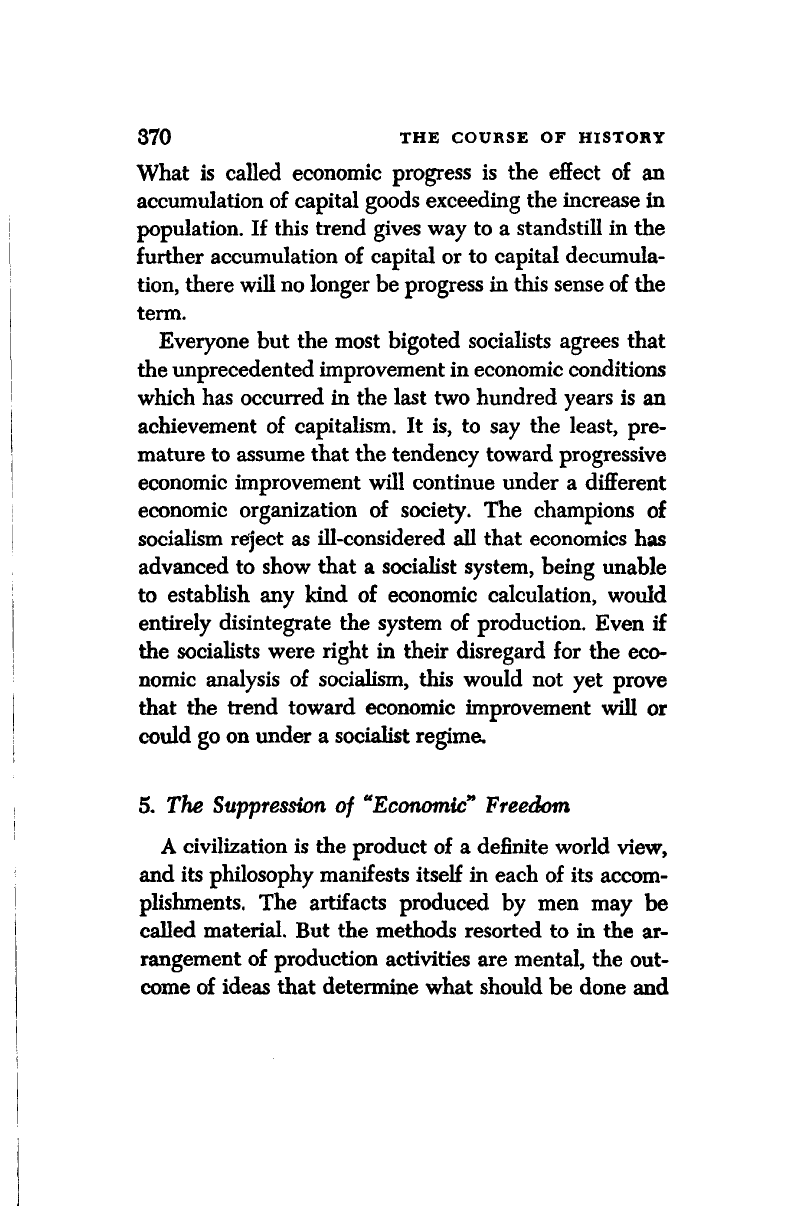
370 THE COURSE OF HISTORY
What is called economic progress is the effect of an
accumulation of capital goods exceeding the increase in
population. If this trend gives way to a standstill in the
further accumulation of capital or to capital decumula-
tion,
there will no longer be progress in this sense of the
term.
Everyone but the most bigoted socialists agrees that
the unprecedented improvement in economic conditions
which has occurred in the last two hundred years is an
achievement of capitalism. It is, to say the least, pre-
mature to assume that the tendency toward progressive
economic improvement will continue under a different
economic organization of society. The champions of
socialism reject as ill-considered all that economics has
advanced to show that a socialist system, being unable
to establish any kind of economic calculation, would
entirely disintegrate the system of production. Even if
the socialists were right in their disregard for the eco-
nomic analysis of socialism, this would not yet prove
that the trend toward economic improvement will or
could go on under a socialist regime.
5. The Suppression of "Economic* Freedom
A civilization is the product of a definite world view,
and its philosophy manifests itself in each of its accom-
plishments. The artifacts produced by men may be
called material. But the methods resorted to in the ar-
rangement of production activities are mental, the out-
come of ideas that determine what should be done and
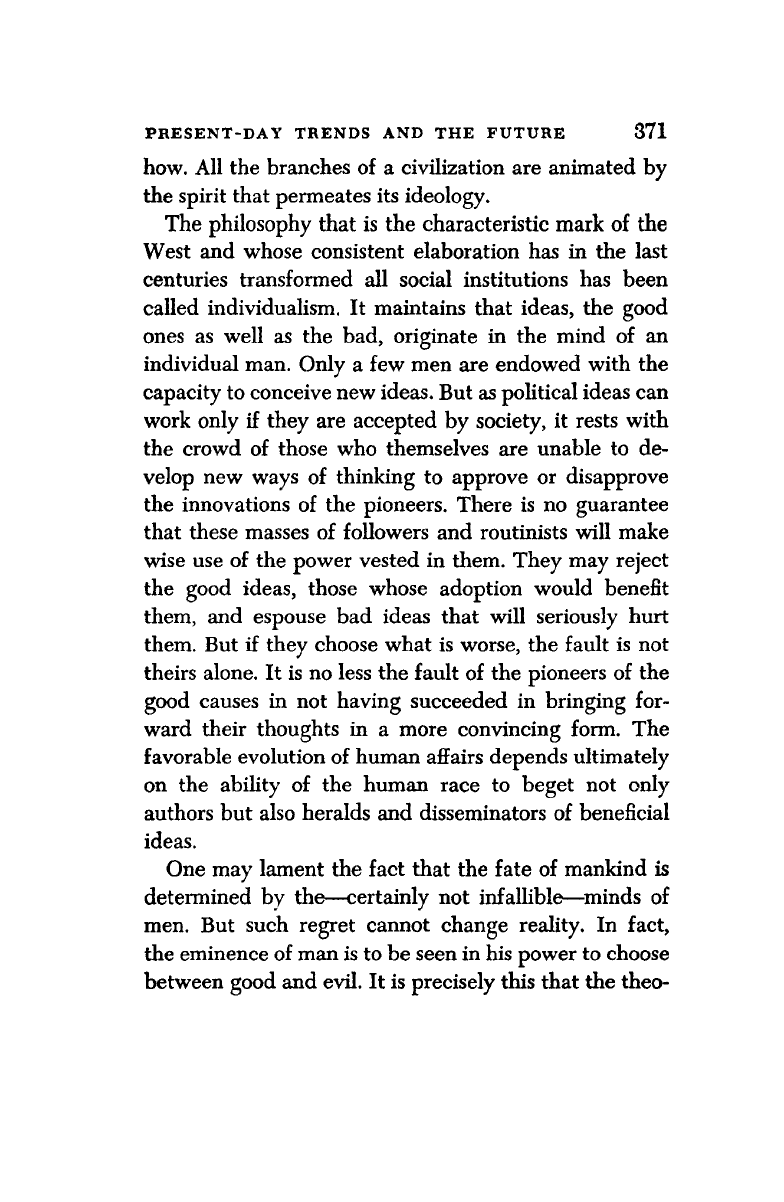
PRESENT-DAY TRENDS AND THE FUTURE 371
how. All the branches of a civilization are animated by
the spirit that permeates its ideology.
The philosophy that is the characteristic mark of the
West and whose consistent elaboration has in the last
centuries transformed all social institutions has been
called individualism. It maintains that ideas, the good
ones as well as the bad, originate in the mind of an
individual man. Only a few men are endowed with the
capacity to conceive new ideas. But as political ideas can
work only if they are accepted by society, it rests with
the crowd of those who themselves are unable to de-
velop new ways of thinking to approve or disapprove
the innovations of the pioneers. There is no guarantee
that these masses of followers and routinists will make
wise use of the power vested in them. They may reject
the good ideas, those whose adoption would benefit
them, and espouse bad ideas that will seriously hurt
them. But if they choose what is worse, the fault is not
theirs alone. It is no less the fault of the pioneers of the
good causes in not having succeeded in bringing for-
ward their thoughts in a more convincing form. The
favorable evolution of human affairs depends ultimately
on the ability of the human race to beget not only
authors but also heralds and disseminators of beneficial
ideas.
One may lament the fact that the fate of mankind is
determined by the—certainly not infallible—minds of
men.
But such regret cannot change reality. In fact,
the eminence of man is to be seen in his power to choose
between good and evil. It is precisely this that the theo-
